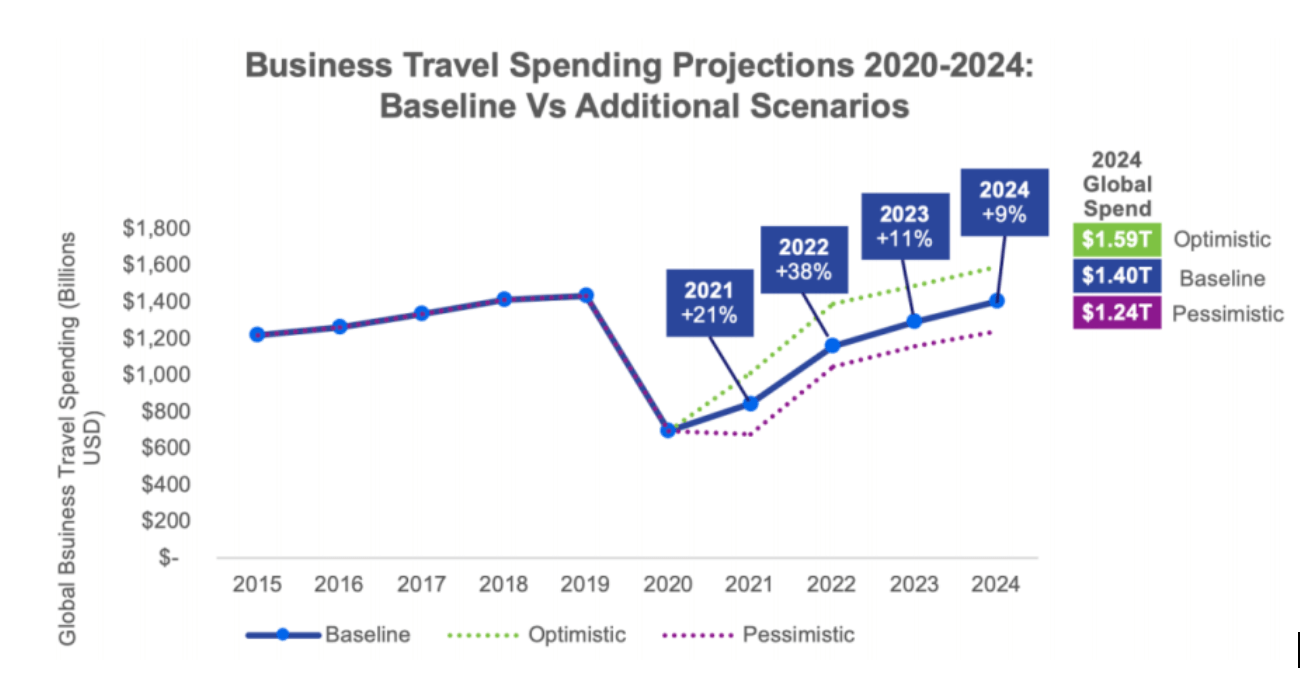It’s true—GBTA 2021 happened November 17–19th in Orlando, Florida. Emburse was one of the exhibitors and we were lucky enough to host our own Conference sessions. Everyone who attended had a blast.

For anyone who really wanted to attend but couldn’t make it, we’ve got you covered. This year’s GBTA Convention was designed with virtual attendance in mind. From November 29th to January 28th, five recorded main stage presentations and over 25 educational sessions will be available for on-demand replay.
If you haven’t already, you can register here. In the meantime, here’s what went down at this year’s Conference.
1. The state of business travel in 2021 and beyond
The most recent GBTA BTI Outlook looked at how business travel fared in 2021, with projections for 2022 and beyond. Now in its 13th edition, the BTI Outlook examines business travel spending and across 73 countries and 44 industries.
This year’s survey includes insights from both global senior financial executives and business travelers.
Global business travel activity into 2025
While global business travel definitely rebounded this year, it still hasn’t recovered to pre-pandemic levels. After declining 53.8% in 2020 to $661 billion, global expenditures are expected to rebound 14% in 2021 to $754 billion.
Fortunately, global business travel spending is expected to recover much faster in 2022. BTI Outlook participants expect a 38% surge to over $1 trillion in spending as pent-up demand and continued vaccine rollouts kick travel into a higher gear.
The momentum from this strong recovery will continue well into 2023, with global spending rising 23% year-over-year as more borders reopen, pandemic travel restrictions ease, and international travel comes back online.
Business travel is expected to fully recover by 2024, a year sooner than previously forecast. Experts predict that global business travel spending may hit $1.4 trillion by the end of the year, which would finally bring global travel spending back to pre-pandemic levels.

In 2025, business travel growth may finally slow down to 4.3%, slightly below the 10-year average growth rate of 5.1% ending in 2020. But that will still be enough to set a new record with a forecasted $1.5 trillion in spending.
While the state of the travel industry and diversity, equity, and inclusion were hot topics on the Main Stage this year, many of the educational sessions were deep dives into some of the more nitty-gritty T&E topics we all want to learn more about.
2. Session spotlight: Non-employee travel and expense considerations
One of the educational sessions you can watch at your leisure features Emburse VP Rebecca Sheehan, who discusses travel and expense considerations for non-employees.
Watch: T&E’s Final Frontier: Best Practices for Managing Non-employee Travel Spend (You have to be registered to watch this recording)
Non-employees, such as job candidates, are often overlooked because managing their T&E can be tedious and time-consuming manual work. In this session, Sheehan addresses non-employee travel questions and concerns, like whether it makes sense to issue corporate cards for non-employees.
Here are some of the major takeaways from this session:
- Learn how a global accounting firm deployed a solution to automate job candidate spending, supporting up to 2,000 candidates annually while cutting expense approval and reimbursement times from 4–6 weeks to 1–2 days.
- Complex, cumbersome T&E processes are not only ineffective, but they can also lead to non-compliant transactions getting overlooked, and even potential fraud.
- Forward-thinking companies are adopting virtual card issuance for non-employees, which is quick, safe, and offers more flexibility and control on the part of the card issuer.
3. Session spotlight: Giving employees corporate cards
Cortney Clark, VP of Emburse Cards, and Jeroen van Velzen, SVP of Solutions Strategy at Emburse, co-hosted another on-demand session full of helpful corporate spend insights.
Watch: Getting Carded: Is it Time to Give all of Your Employees Corporate Cards? (You have to be registered to watch this recording)
Corporate cards were once exclusively reserved for seasoned business travelers. But given the myriad benefits and improved security features of modern card programs (which often feature virtual cards), maybe it’s time to review your organization’s card programs.
Here are some of the major takeaways from this session:
- Corporate cards have been synonymous with business travel for decades. But what was a great idea 20 years ago makes less sense today.
- Virtual cards have finally hit their stride with remote and hybrid workers more comfortable than ever with digital payment methods. Plastic isn’t usually a satisfying employee experience, either.
- At leading companies and financial institutions, plastic cards are becoming obsolete. Virtual cards are programmable, easy to use, and far less risky for card issuers.

4. Session spotlight: Corporate travel tech trends
Jeroen van Velzen, SVP of Solutions Strategy at Emburse, also participated in a multi-speaker panel on the latest corporate travel technology trends and new entrants in the marketplace.
Watch: Tech Trends – New Players and Industry Experts (You have to be registered to watch this recording)
Here are some of the major takeaways from this session:
- Learn about the journeys of startups from Tech Safari to Innovation Row. Find out what goes into building a brand suitable for today’s corporate travel buyers and suppliers.
- Discussion topics include travel risk mitigation, the latest on vaccine passports, how duty of care has changed, spend controls and approvals, sustainability, airline distribution & NDC, business travel AI, TMC 3.0, brand personalization, and much more.
5. Biggest moves and partnerships
Speaking of the travel marketplace, this year’s GBTA Conference was a who’s who of household brands partnering with travel companies in new and exciting ways:
- Southwest Airlines brings more enhancements to business travelers and travel managers.
- American Airlines, British Airways, American Express Global Business Travel, and Qured are offering complimentary COVID-19 test kits to international business travelers.
- HRS partners with Citi to help companies start automating their lodging payments.
- BCD Travel introduced BCD Alert to meet the rising demand for 24/7 traveler security.
- Everbridge introduced its new travel risk management solution for business healthcare and government customers.
Facing the future head-on
In the fast-paced, ever-changing business world we live in today, it pays to stay ahead of the curve. At GBTA 2021, we saw firsthand how dozens of forward-thinking airlines, travel firms, and T&E managers are doing just that despite the pandemic.
Modern T&E management solutions should offer smart automation and predictive data analytics, accommodate a growing remote workforce and as-needed business travel, and support increasing cloud and mobile workflows.
Is your T&E management solution doing your company justice? Take your organization’s spend management capabilities to the next level — and beyond. Use our Spend Optimization Model to understand your current challenges and the potential ROI from optimizing spend.
Search
Subscribe
Latest Posts
- The Future of Finance: 5 Predictions For Digital Transformation in 2022 And Beyond
- Worried About Business Fraud? Use This B2B Pandemic Payment Fraud Checklist
- 5 Reasons Why Finance & Procurement Work Better Together
- Measure What You Manage: How to Make The Case for AP Automation With ROI To Your CEO
- A Brave New World: 3 Ways for Finance Teams to Navigate the Post- Pandemic Landscape
Posts by Category
Our choice of Chrome River EXPENSE was made in part due to the very user-friendly interface, easy configurability, and the clear commitment to impactful customer service – all aspects in which Chrome River was the clear winner. While Chrome River is not as large as some of the other vendors we considered, we found that to be a benefit and our due diligence showed that it could support us as well as any large players in the space, along with a personalized level of customer care.
We are excited to be able to enforce much more stringent compliance to our expense guidelines and significantly enhance our expense reporting and analytics. By automating these processes, we will be able to free up AP time formerly spent on manual administrative tasks, and enhance the role by being much more strategic.